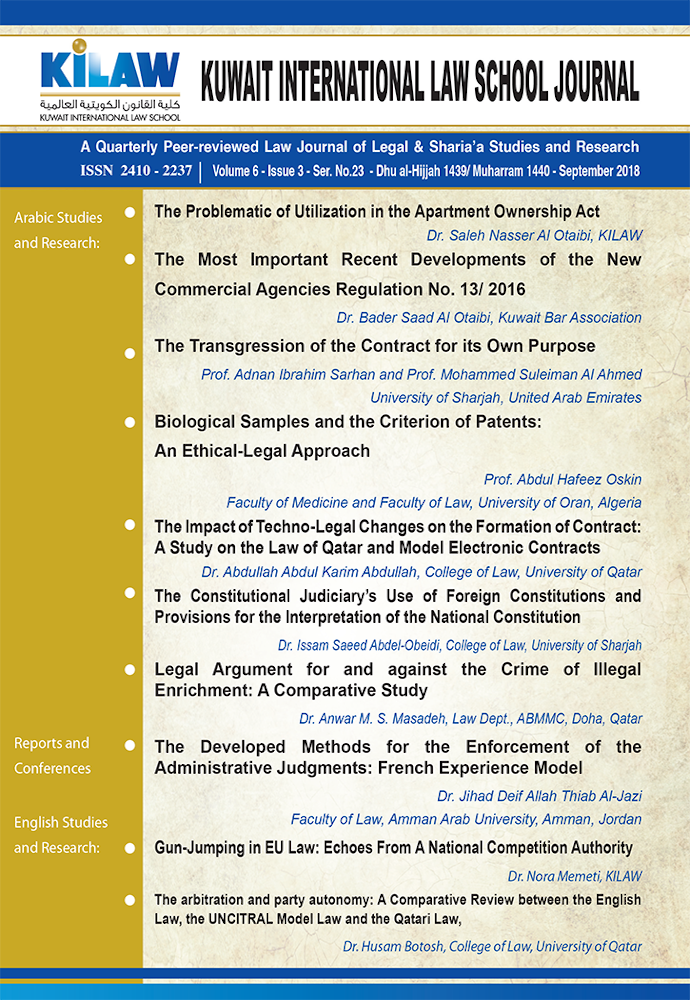Editor-In-Chief Prof. Badria A. Al-Awadi
One of the most important measures of establishing the National Office for Human Rights in Kuwait has been completed through the issuance of an Emiri Decree on the formation of its Board of Directors consisting of Kuwaiti competencies with diverse human rights and legal expertise, as well as the promulgation of law no. 67/2015, amended on 3 April 2018.
It is well known that the establishment of this office came within the framework of Kuwait’s cooperation with the requirements of UN General Assembly Resolution 48/134, which encourages Member States to: “Establish national institutions for the promotion and protection of human rights” as well as in response to a proposal by the United Nations Human Rights Council after their review to Kuwait’s human rights record in 2010, which has been implemented by several Arab and Islamic countries, including Saudi Arabia, Qatar, Tunisia and others.
In addition, the establishment of this official legal framework has been a request by a number of personalities and Kuwaiti civil society organizations during the past period, with the aim of developing institutional work and promoting awareness in the field of protection of human rights, especially as Kuwait was a pioneer in establishing such values in the early stages of developing the principles and provisions of the Kuwaiti Constitution of 1962. However, the expansion of business and government agencies and the complexity of the manifestations and problems of social life posed several challenges in several areas, including the field of freedoms and human rights.
Article 6 of the law establishing the Office listed 15 competencies directly related to the promotion of the protection of human rights including in particular the expression of opinion, the submission of recommendations, proposals and reports to the concerned parties, as well as issued that are referred to the Office by the National Assembly and the Council of Ministers (paragraph 1), preparing legal and factual studies and issuing annual reports on the development of the human rights situation in the State of Kuwait (paragraphs 2 and 5), receiving complaints and monitoring cases of violations of human rights, studying and investigating these cases and referring certain cases to concerned authorities, coordinating and following up such cases, providing guidance to complainants regarding the necessary legal procedures to be followed and assisting them in taking, settling or resolving their issues with the parties concerned (paragraph 3). These competencies terms of reference also include following up the application of the articles of the Constitution related to international freedoms, conventions and treaties relating to human rights in Kuwait, making the necessary proposals to the concerned parties regarding their proper implementation (paragraph 4), in addition to monitoring the centers of correctional institutions (prisons), detention centers (temporary confinement) and various care centers, through periodic or unannounced visits and issuing reports on their situation (paragraph 9).
There is no doubt that these competencies are fundamental and important in terms of the human rights situation in any country. Law no. 67/2015 is indeed correct and the Office’s proper implementation of these competencies would grant it effectiveness and credibility as well as an added value to official institutions in Kuwait, especially since the law provides for the provision of all necessary resources, including the use of a Secretary-General and a sufficient number of experts, specialists and qualified personnel.
On the other hand, some see that the subordination of the Office to the Council of Ministers may reduce its effectiveness and make it under the authority of the government and its organs, which impedes its work in the form of a supervisory character in the promotion of the protection of human rights. However, others respond to this claim by confirming that this dependency is partial and merely administrative, because the designation of the President and Vice-President is carried out jointly by the Council of Ministers and the National Assembly. While the explanatory memorandum to the law sought to clarify this by stating that the Office is “not an administrative or governmental body in accordance with the prevailing legal concept … it is a permanent national organ concerned with the protection of human rights and freedoms,” the political will of the government and the National Assembly will determine the chances of success of this new national legal framework as an opportunity to develop the culture and reality of human rights in the country.
Finally, and with the beginning of the new academic year, we would like to renew the call for intellectuals and researchers in the legal fields in Arab university and schools of law to participate in the coming issue of the Journal, as it has expanded its readership base to include various Arab universities and research centers as well as foreign universities which achieves the required academic benefit and enhances the level of research engagement.

